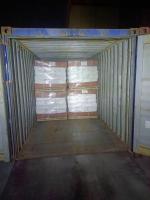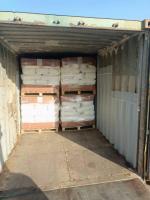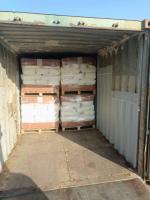Our Products
Flocculant / Nonionic flocculant of magnafloc 333 can be repalced by Chinafloc N0009

Nonionic flocculant of magnafloc 333 can be repalced by Chinafloc N0009
magnafloc 333 is kind of nonionic flocculant with higher molecualr weight ,mainly used for kinds of mineral processing.
Nonionic flocculants are water-soluble polymers that do not carry any electrical charge. These flocculants are highly effective in a wide range of industrial and environmental applications, particularly in water and wastewater treatment, paper production, mineral processing, and various other industries. Their key attribute—being non-ionic—makes them versatile and effective across many different conditions, particularly where ionic charges are not desired or where other types of flocculants (e.g., cationic or anionic) may not perform as well.
1. Water and Wastewater Treatment
One of the primary applications of nonionic flocculants is in water and wastewater treatment, where they play a critical role in clarifying water and aiding in the removal of suspended particles. In this context, nonionic flocculants are typically used in both municipal and industrial wastewater treatment plants.
a. Clarification
Nonionic flocculants help in the clarification of water, a process where suspended solids, organic matter, and colloidal particles are aggregated or "flocculated" into larger clumps. These clumps can then be removed more easily by settling or filtration. The nonionic nature of these flocculants ensures that they work in neutral pH conditions, making them ideal for systems where acidic or basic conditions would inhibit the performance of ionic flocculants.
b. Sludge Dewatering
Nonionic flocculants are widely used in sludge dewatering, which is essential in managing and reducing the volume of sludge produced by wastewater treatment processes. The flocculant forms a gel-like structure that binds the sludge particles together, making them more easily separated from water. This process is crucial for minimizing waste volumes and making the sludge easier to handle, process, and dispose of.
c. Filtration
In water treatment, nonionic flocculants are often employed to enhance the performance of filtration systems, especially in municipal drinking water purification. By improving the agglomeration of fine particles into larger flocs, nonionic flocculants increase the efficiency of filtration units, making it easier to separate contaminants from the water.
d. Oil and Grease Removal
In industrial wastewater treatment, nonionic flocculants are used to remove oil and grease. These substances can cause severe environmental pollution if not properly treated. Nonionic flocculants help aggregate and remove oil droplets, emulsified fats, and other organic contaminants from industrial wastewater, particularly from the food processing, petrochemical, and textile industries.
2. Mineral Processing
Nonionic flocculants are particularly effective in the mineral processing industry, where they are used to aid in the recovery of minerals and in the beneficiation of ores. In mineral processing, the extraction of valuable minerals from their ores often generates large volumes of slurry containing finely divided particles.
a. Coal Washing
In coal processing, nonionic flocculants are commonly used in coal washing operations. The flocculants facilitate the separation of coal from impurities like ash, clay, and fine silica. This process is crucial for improving the quality of coal before it is used in power generation or other industrial applications.
b. Iron Ore Beneficiation
Nonionic flocculants are also used in iron ore beneficiation, where they aid in the separation of iron ore from gangue (undesirable materials) in the slurry. Flocculation helps the finer particles of gangue and iron ore agglomerate, allowing them to be removed more efficiently in the beneficiation process.
c. Gold and Silver Mining
In gold and silver mining, nonionic flocculants can be employed to enhance the recovery of these precious metals during leaching and separation processes. The flocculants help in solid-liquid separation, making the process more efficient and less costly.
3. Pulp and Paper Industry
In the pulp and paper industry, nonionic flocculants are widely used to improve paper quality and production efficiency. They are especially valuable in dewatering and sheet formation processes. Their non-ionic nature ensures that they work effectively without negatively impacting the charge balance in the system, which is critical when processing the paper pulp.
a. Dewatering of Pulp
The dewatering of pulp is an essential step in paper production, as it allows for the efficient removal of excess water from the slurry before the paper sheet is formed. Nonionic flocculants help to form flocs that bind the fibers together, facilitating the removal of water and ensuring that the pulp retains the correct consistency for paper formation.
b. Retention of Fine Particles
In paper production, nonionic flocculants also assist in the retention of fine particles, such as fibers and fillers, during the papermaking process. By aggregating fine particles into larger flocs, these flocculants prevent them from being lost during drainage and filtration, which can reduce product quality and increase waste.
c. Improving Drainage and Formation
Nonionic flocculants improve the drainage of excess water from the paper pulp and ensure a smoother paper formation process. In this context, they help reduce energy costs and improve production speeds while ensuring the paper quality is consistent.
4. Agriculture and Soil Stabilization
In agriculture, nonionic flocculants have found applications in the stabilization of soil, enhancing irrigation efficiency, and improving water retention.
a. Soil Erosion Control
Nonionic flocculants can be applied to control soil erosion, especially in regions prone to heavy rainfall. By aggregating soil particles, nonionic flocculants help reduce the risk of soil loss and improve the stability of the soil structure, which is crucial for preserving agricultural land.
b. Irrigation Efficiency
Nonionic flocculants can also be used to improve irrigation efficiency by reducing water loss due to seepage or surface runoff. By improving the ability of soil to retain water, these flocculants can help conserve water resources and improve crop yields in arid regions.
c. Wastewater Irrigation
In wastewater irrigation systems, nonionic flocculants are used to improve the quality of the water and help remove contaminants before they are applied to agricultural fields. This ensures that wastewater can be reused safely for irrigation without harming crops or the environment.
5. Oil and Gas Industry
In the oil and gas industry, nonionic flocculants play a crucial role in various processes related to the extraction, transportation, and refining of crude oil and natural gas.
a. Drilling Mud Treatment
During the drilling of oil and gas wells, nonionic flocculants are often used to treat drilling muds. These muds are essential for cooling the drill bit, stabilizing the wellbore, and transporting rock cuttings to the surface. Nonionic flocculants help improve the settling rate of solid particles, ensuring the mud maintains its necessary properties throughout the drilling process.
b. Produced Water Treatment
In the oil and gas industry, nonionic flocculants are employed to treat produced water—a byproduct of oil and gas extraction. Produced water typically contains high concentrations of salts, oils, and other contaminants that need to be removed before the water can be safely disposed of or reused. Nonionic flocculants help remove suspended particles and oils from produced water, ensuring compliance with environmental regulations.
6. Textile Industry
The textile industry uses nonionic flocculants for water treatment and in the dyeing and finishing processes.
a. Wastewater Treatment
Nonionic flocculants are commonly used in textile wastewater treatment to remove dye and other pollutants from wastewater. They help aggregate the suspended dyes and particulate matter, making it easier to separate and remove them from the water.
b. Fabric Treatment
Nonionic flocculants are sometimes employed in fabric finishing processes, such as bleaching and dyeing, to improve the quality of the finished product by ensuring better dye uptake and preventing uneven dyeing or staining.
Conclusion
Nonionic flocculants are versatile polymers with broad applications across multiple industries. Their non-ionic nature makes them particularly effective in processes where charge neutrality is important or where other types of flocculants may be ineffective. In water and wastewater treatment, mineral processing, paper production, and many other fields, nonionic flocculants are critical for improving efficiency, reducing costs, and enhancing the quality of products. Their role in facilitating the removal of suspended particles, enhancing filtration, improving dewatering processes, and controlling soil erosion underscores their importance in both environmental protection and industrial applications.




